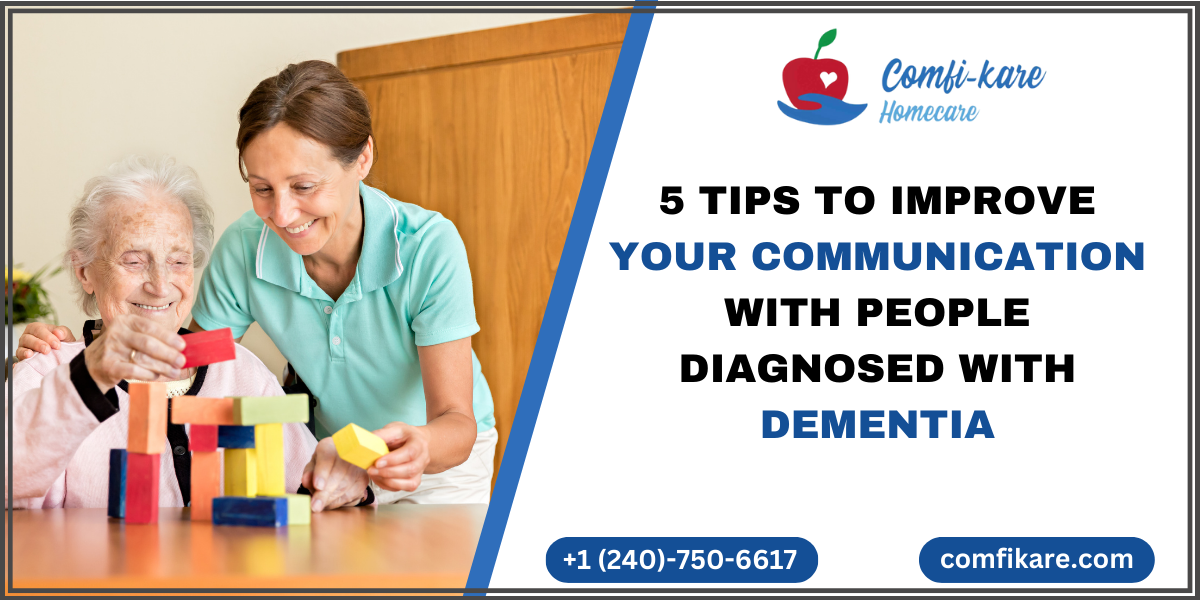Communicating with someone diagnosed with dementia can be extremely overwhelming. Family caregivers, offering dementia care, may find it extremely challenging when their loved ones diagnosed with dementia are unable to recall small instances.
Therefore, it is crucial to understand the dos and don’ts of communication when talking to your loved one. Always remember that patience is a virtue, so whenever you approach someone diagnosed with dementia, always have patience and listen to them without interruptions. Such dementia care tricks will help you enhance the relationship between you and your loved ones.
By establishing meaningful communication, you can always navigate the challenges that your loved one has been facing. However, at any point in time, you may feel overwhelmed by all your thoughts about caregiving responsibilities. With various memory care options, you can always add extra help from in-home caregivers.
In the following blog, I am going to outline some important dementia care tips to implement and communicate with someone diagnosed with dementia.
Memory Care Tips To Improve Communication With Loved Ones Diagnosed With Dementia:
Memory Care Tip 1: Never Use Terms Like No, Don’t, or Can’t.
Using certain terms like no, don’t, or can’t, can cause resistance and anger. For instance, when you tell your loved one, “You can’t drive a car,” he or she may get angry and won’t listen. So, instead of that, you could say, “I am concerned about your safety; I know you can drive, but you know, when I was driving last night, I saw this, and that was extremely dangerous.”
Tell your loved one about the situation and wait for their response. Provide a clear and concise answer to why your loved one can no longer drive on their own. Telling your loved one about the specific situation can help them understand your concern for their safety.
Memory Care Tip 2: Don’t Baby talk; it is Insulting
Even though your loved one has difficulty comprehending the conversation, that does not mean you can use baby talk to make it more incomprehensible. This is shallow, and older adults should be treated with respect and dignity, even at communication levels.
Use an adult-to-adult approach while talking and be respectful about the whole communication.
Memory Care Tip 3: Don’t argue with or correct them
Once, I went to meet a person diagnosed with dementia. I had taken a family picture and asked her about her son. She started describing what his job was like, how he used to call once a week, and so on. When I picked up another photo and asked where her son was in that photo, she replied she didn’t have a son. I corrected her and said that a while ago, she had described her son. She felt bad about it, and I was embarrassed.
Over the years, I learned never to correct a person diagnosed with dementia, as it may upset or cause frustration. It is important to create a calm and positive environment and give people some time to respond without creating any confusion.
Memory Care Tip 4: No Open-Ended Question
Always remember not to ask too many open-ended questions, as it may cause frustration. Asking open-ended questions about the past is stressful, as your loved one may not be able to answer them. It is better to ask them about what is happening now and focus on the present scenario.
Here is something you can do: explain briefly about your day and give them time to respond or ask you some questions. Talk about yourself, and use some props like photos or drawings to initiate your conversation.
Memory Care Tip 5: Non-Verbal Cues
As conversations can be challenging after a prolonged period of time, there are some other ways to initiate a conversation. For instance, maintain eye contact and use verbal cues or aids like photos and objects to enhance a conversation.
You can also use written notes to convey messages or use facial expressions or gestures to strike up a conversation.
Initiating a conversation with someone diagnosed with dementia can be extremely challenging. Therefore, caregivers offering memory care at homes help their loved ones with a better company and with the activities of daily living.
How To Find The Right Memory Care in Silver Spring, Maryland?

Although there are many dementia care facilities in Silver Spring, if your loved one is diagnosed with early-stage dementia, he or she is capable of living independently. You can always find an Alzheimer’s caregiver for your loved one. They help reduce the risk of dementia progression.
Finding Dementia care in Silver Spring
Comfikare Homecare provides the best memory care in Silver Spring, Maryland, to help loved ones and their families. With various in-home memory care opportunities, your loved one can be safe and secure at home. Our trained caregivers offer a customized memory care approach because dementia stages and symptoms vary.
Get the best memory care in Silver Spring, Maryland now.
Book your dementia caregiver now!

